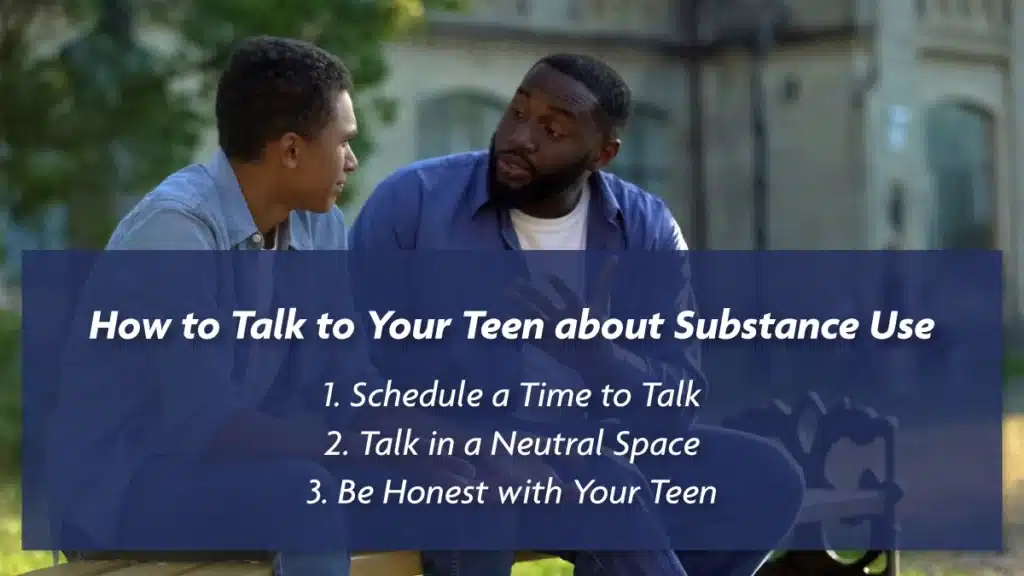Navigating the challenges of being a teenager can sometimes lead to a rough path, like underage drinking or taking drugs. Young adult’s substance abuse is a pressing societal concern with severe health and social consequences. They are not aware of the harm that drug misuse can cause and use them for their soothing and euphoric effects.
Identifying changes in behavior is crucial in addressing this complex issue. Knowing about the risk factors and the role of parents and educators in promoting healthy lifestyles is vital.
Key Takeaways
Teen substance use, a prevalent concern globally, involves the consumption of alcohol and illicit drugs by individuals aged 12 to 17. Here’s what you need to know about addiction in teens:
- Substance abuse refers to the harmful or excessive use of drugs or alcohol, leading to negative impacts on overall well-being.
- Examining peer pressure, mental health issues, family dynamics, and media influence helps formulate prevention strategies.
- Parents play a vital role by monitoring, encouraging open talks, creating a supportive environment, and providing education.
- Understanding levels of care and utilizing therapies and support groups are essential steps in teen recovery.
Get help for your teens. Call us at (845) 479-6888 today.
A Closer Look at Substance Abuse
Substance abuse encompasses the harmful or excessive use of drugs, including marijuana, cocaine, or alcohol, posing risks to one’s physical and mental well-being. It involves a pattern of consumption that can lead to substance use disorder and harmful consequences.
Curiosity among young adults often leads them to substance abuse. The allure of experimentation, driven by a desire to explore new experiences, can lead adolescents to engage in risky behaviors. Teenagers, while experimenting with these substances, use them in a harmful manner that can have serious consequences, including overdose.
Root Causes of Substance Abuse
In the United States, the prevalence of adolescent substance addiction demands a closer examination of its root causes to formulate effective prevention strategies.
Peer Pressure
Peer pressure stands as a daunting force that influences adolescent decision-making. The desire to fit in and gain acceptance among friends often drives youth to experiment with substances like tobacco, prescription drugs, and alcohol abuse. The dynamics of social circles wield a powerful influence, making it vital to address peer pressure as a critical factor in the initiation of substance use.
Mental Health Problems
The intersection of mental health and adolescent substance use highlights a critical connection. Adolescents grappling with mental health disorders may turn to substances as a coping mechanism, seeking solace from internal struggles. Addressing mental health and addiction issues becomes paramount in preventing these dual challenges from taking hold in vulnerable populations.
Family Environment
The family environment plays a pivotal role in shaping a teenager’s attitude towards substances. The behaviors and attitudes of family members, particularly parents, significantly influence a child’s perception of drug use.
A lack of parental involvement, communication, and support can contribute to increased vulnerability. Dysfunctional family dynamics, such as high levels of conflict, neglect, or inconsistent discipline, may drive teens to seek comfort in using illegal substances.
Media Influence
In the digital age, media exerts a considerable influence on adolescent perceptions. Exposure to substance use in movies, music, and social media can shape teens’ attitudes toward these behaviors.
It plays a significant role in shaping societal norms, influencing opinions, and contributing to cultural trends. Media can both positively and negatively affect how people view themselves, others, and certain behaviors, including those related to substance use.
Role of Parents in Preventing Substance Use

Parents of high school students play a crucial role in explaining addiction to their kids. By being attentive and observant, parents can closely monitor their children’s behaviors, identifying any early signs that could indicate potential substance use.
Open Talks and Supportive Environment
Parents encouraging open discussions help create a space where teens can easily share their worries. That sets the stage for stepping in early and doing something before things worsen.
Moreover, creating a supportive family environment acts as a powerful deterrent to teen drug use. When children feel emotionally secure and connected to their families, they are less likely to get involved in risky behaviors. Engaging in positive activities together, fostering trust, and providing emotional support contribute to a nurturing atmosphere that deters the initiation of substance use.
Education and Awareness
Parents serve as primary educators in a teenager’s life. They impart accurate information about the risks and consequences of drug addiction, empowering their children to make informed decisions.
Age-appropriate discussions about the dangers of drugs and alcohol, coupled with a non-judgmental approach, contribute to building a solid foundation of awareness that aids in preventing substance use.
Setting Clear Expectations and Boundaries
Establishing clear expectations and boundaries is paramount. Consistent and fair rules regarding substance use, along with evident consequences for violation, can help teens navigate their choices. This approach fosters a sense of responsibility and accountability, guiding teenagers away from risky behaviors.
How to Talk to Your Teen about Substance Use
Navigating conversations about drug problems with your teenager requires a thoughtful approach. Effectively addressing this delicate topic involves considering your communication’s timing, environment, and honesty.
Schedule a Time to Talk
Choosing the right time to talk is crucial. Schedule a time when you and your teen can sit down without distractions. That sets a severe tone and shows that you value the conversation. Avoid bringing up the topic in stressful moments; find a time when your teen will likely be receptive.
Talk in a Neutral Space
Selecting a neutral space for your conversation creates a comfortable atmosphere. Avoid aggressive settings; instead, choose a quiet, private space where you and your teen can express thoughts and feelings openly. That promotes a sense of safety, encouraging your teen to share without fear of judgment.
Be Honest with Your Teen
Honesty is critical in discussing substance use. Be open about the risks associated with alcohol and illicit drug use, emphasizing the impact on physical and mental health.
Discuss risk factors, such as low self-esteem, mental illnesses, and peer pressure. Highlight the potential consequences in both the short and long term, including adverse effects on brain development, academic performance, and overall well-being.
Finding the Right Treatment for Your Teen
Seeking treatment for your teen’s substance use is a crucial step in their journey to recovery.
Effective treatment often involves a combination of therapies and support groups. Behavioral therapies, such as cognitive-behavioral therapy (CBT), aim to modify unhealthy behaviors and enhance motivation for change.
Support groups, like 12-step programs or family therapy, provide a network for shared experiences and mutual encouragement. Tailoring the treatment approach to your teen’s unique circumstances ensures a comprehensive and supportive path toward recovery.
Frequently Asked Questions
How can parents deal with teen substance abuse?
Addressing teen substance abuse involves open communication, understanding, and seeking professional help. Establish a non-judgmental environment for your teen to share their struggles.
Educate yourself about substance abuse, recognize warning signs, and seek guidance from healthcare professionals or counselors. Enlist support from friends, family, and support groups to navigate the challenges together.
What is the best way to deal with teenagers doing drugs?
The most effective approach involves open communication, setting clear boundaries, and seeking professional intervention. Maintain a supportive environment to encourage honesty and expression of feelings.
Establish consequences for drug use, emphasizing the importance of seeking help. Collaborate with healthcare providers, therapists, and school counselors to address underlying issues and guide the teenager toward recovery.
What is the effect of drugs on teenagers?
Drugs can significantly impact teenagers physically, mentally, and emotionally. Short-term effects may include impaired judgment, academic decline, and risky behaviors.
Long-term consequences may involve addiction, mental health disorders, and compromised brain development. Recognizing these risks, educating teens on the potential effects, and fostering an open dialogue to discourage experimentation and promote informed decision-making is crucial.
Securing Their Future Through Residential Rehabilitation
Are you concerned about your teen’s future amidst the dangers of substance abuse? Our teen treatment center is here to help them live a life without relying on addictive substances.
Our comprehensive services include residential rehab, providing a supportive environment for teens struggling with substance use. With a focus on holistic healing, we offer family and group therapy at our teen treatment facility.Your teen doesn’t have to face this challenge alone—let us be there every step of the way. Contact our staff by calling us at (845) 479-6888 today.


